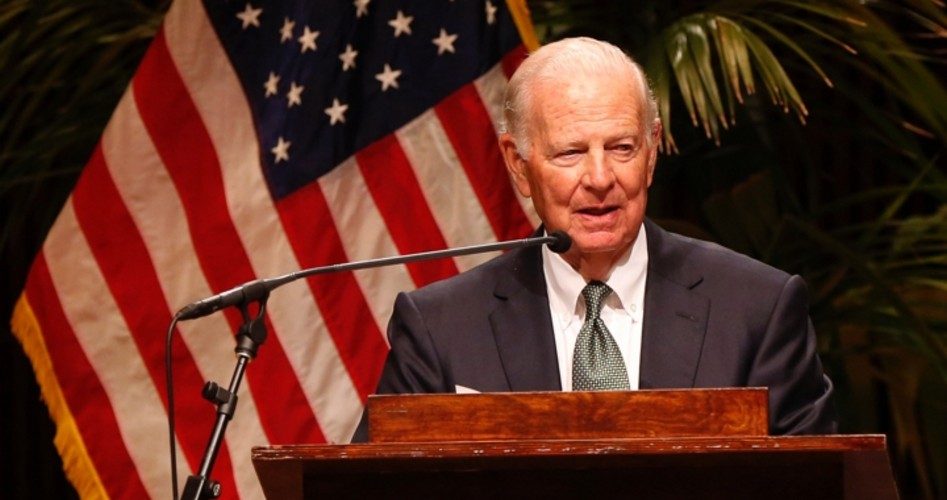
On September 19, 2016, at Rice University’s Baker Institute for Public Policy in Houston, James A. Baker III (shown), former chief of staff to President Ronald Reagan and later secretary of state and of treasury, introduced U.S. Trade Representative Michael Froman, who then gave a speech promoting one of the new “free trade” agreements called the Trans-Pacific Partnership (TPP). According to both men, our country can only make one realistically constructive choice: U.S. adoption of, and accession to, the TPP.
During the 55-minute-long event, Baker’s introductory speech ran about five minutes, Froman’s speech took about 15 minutes, and Froman then answered 11 questions from the audience in the remaining 35 minutes.
Both of their speeches were masterpieces of rhetoric, designed to appeal to the concern of all Americans for more and better-paying jobs, to the prideful nationalism of neo-conservatives who are concerned about “America’s role in the world,” and to the sentiments of progressives who are concerned that we ought to do something about labor and environmental standards within the borders of many of our trading partners.
In his short speech before introducing Froman, Baker asserted that “free trade” agreements have always deservedly enjoyed “bipartisan” support, and there’s simply no reason not to pass the TPP during the upcoming lame-duck congressional session after the November elections. According to Baker,
Both major party candidates for the presidency oppose the Trans-Pacific Partnership, or TPP. And guess what — they’re both wrong. And more and more voices here in the United States are calling for a general retreat from free trade and investment. They’re wrong, too. The consensus in both of our major political parties in favor of liberalized trade and investment is under attack, and that’s not only wrong, but it’s extremely bad for our country as well.
That’s because free and fair — yes, it has to be fair — free and fair trade is good for the United States, and it’s good for the world. It encourages economic growth, and economic growth, after all, is what creates jobs — jobs for Americans. It bolsters wages, and it fosters innovation. And it promotes international stability by creating deep and durable links between allies and adversaries alike. The TPP does all of this in one of the most economically dynamic and strategically important regions of the world.
President Obama is pushing for passage of the TPP during the lame-duck session of the Congress. I’ve often found myself in disagreement with President Obama, but on the TPP, I am with him, and I am with him one hundred percent.
Baker argued that passage of the TPP “is absolutely in the vital interest of the United States,” continuing:
Since World War II, the United States has been a global leader in fostering an international regime of free trade and investment. Republican and Democratic administrations alike have promoted agreements, like GATT, NAFTA, and the WTO, and countless bilateral agreements. And they have done so in the knowledge that trade is a foundation of our national prosperity and our international influence. TPP is simply too important an issue to be decided by political posturing and pandering. It demands that rarest of things in today’s polarized Washington, and that is bipartisanship.
Failure to pass this agreement will cede economic and strategic leadership in Asia to China and other countries. Ultimately, agreements like this are a test of our national character. Are we a country that looks inward, afraid of the world and the challenges that it holds? Or are we a country that looks outward, confident in our ability to compete and win in the global marketplace? I know what my answer is to those questions, and I suspect that it is the same answer that the American people will give, too, once they understand the facts, and once they appreciate the stakes.
After Baker’s speech, Froman took the stage. Froman earned a doctorate in International Relations from the University of Oxford and a law degree from Harvard University. In his speech, Froman praised the 70-year history of “bipartisan” “free trade” agreements while whitewashing their dismal record, even asserting that the TPP is the best way to deal with China. He listed multiple benefits that he claimed only the TPP can provide, and he concluded with a series of questionable binary alternatives favoring passage of the TPP while glossing over the loss of U.S. sovereignty that would result if the TPP were passed.
Froman’s carefully crafted speech also leaves no doubt that he believes we would be foolish to reject the TPP. Acknowledging the “perception that China doesn’t play by the same rules that we and much of the rest of the world do, that it’s taking advantage of us, and that it’s asserting its interests in the Asia-Pacific region, and more generally, at the expense of ours and at the expense of its neighbors,” Froman asserted, “The answer to China’s challenge is not to withdraw from TPP, but to put it in place as soon as possible.”
Froman has a favorable assessment of the history and the consequences of U.S. “free-trade” agreements, which he calls a “rules-based system”:
Backed by American leadership, the open rules-based trade system helped Asia rise peacefully, lifting over one billion people out of poverty. It’s impossible to count the number of conflicts that never occ urred, but we know that for the last 40 years — those years have been the longest stretch of time in [modern] history without interstate wars in the Asia-Pacific. And it’s clear that the entire world is safer when rules allow disputes to be settled by gavels, not guns, and when economic opportunity exists where it might otherwise not have been present.
While it is true that there have been few open wars in the Pacific region over the last 40 years, this writer has trouble imagining how Froman could have more shamelessly glossed over the planned, slow-motion, systematic pillaging of the U.S. economy, aided and abetted by our own government, through the globalist-inspired “free-trade” agreements during that time period.
According to Froman, the TPP offers multiple benefits, in particular to the U.S. economy. For example, the TPP “cuts or eliminates over 18,000 foreign taxes or tariffs on US exports, [thereby] making it easier for American workers, farmers, ranchers, and businesses of all sizes to compete and win in the global economy.” One has to wonder — if the TPP is so good for the United States, why would the other member countries in the Pacific region sign on to it? Foreign tariffs on U.S. exports are currently high in order to provide a source of government income in other countries and to protect their nascent industries from U.S. competition. Why would they give up their protective tariffs?
Furthermore, Froman argues, the TPP would “raise labor and environmental standards, … ensure that government-owned corporations have to compete fairly against private firms … protect intellectual property rights … [and] maintain a free and open Internet.” Why indeed would those countries that have heretofore shown no concern about these issues decide to join the TPP? And just exactly how would such standards be enforced?
The concluding section of Froman’s speech is built on a series of questionable binary alternatives. Froman implies that we must choose either the positive consequences of passing the TPP or the negative consequences of rejecting the TPP. For example:
We can strengthen the rules-based system, as we are working to do on everything from maritime security to trade, or we can open the door to a system in which might makes right and our allies and partners in the region have little recourse.
We can give our partners and allies the strength and assurances they seek, or we can weaken their confidence and encourage them to look elsewhere for support….
We can knock down barriers to American exports and raise standards abroad to preserve and support more well-paying jobs here at home, or we can allow other countries to capture the growth from global markets and see our economic opportunities decline.
We can level the playing field for our workers, or we can condemn them to fighting the same fight against unfair trade with one hand tied behind their backs.
We can lead, or we can concede that role to China.
But guess what? There is another, positive alternative that both Baker and Froman deliberately leave unmentioned. This alternative is essential for preserving our sovereignty as an independent nation. What if the American people were to ditch all of these job- and sovereignty-killing “free trade” agreements and insist that the U.S. Congress exercise its constitutional authority to regulate U.S. commerce with foreign nations, just as our Founding Fathers intended?
Both Baker and Froman deliberately avoid mentioning anything about how the TPP, like all of the preceding “free-trade” agreements, would further undermine this constitutional role of Congress “To regulate Commerce with foreign Nations” (Article I, Section 8). By voting for passage of the TPP, Congress would be helping to lay the foundations of a new regional governmental structure that would independently regulate trade among the nations of the Pacific region, thereby undercutting the constitutional responsibility of Congress to regulate U.S. commerce with those foreign nations. Furthermore, if the TPP were passed, it would establish TPP tribunals from which there would be no appeal within the U.S. judicial system.
In other words, in spite of all its promised benefits, passage of the TPP would further undermine the constitutional authority of Congress to regulate our commerce with the nations of the Pacific region by establishing an extra-constitutional, unelected governmental structure with its own independent tribunals. And when our trade decisions are made by a governmental entity that is not responsible to the American people, sooner or later, we can expect our interests to be sacrificed to those of other nations.
Both Baker and Froman make it very clear that they are fully invested in passing yet another “free-trade” agreement. Considering the disastrous economic effects of allowing inexpensive, foreign-made goods to flood the American marketplace under existing “free-trade” agreements, it strains credulity to hear Baker and Froman assert that this time, it will be different, and that foreign trade regulated by the TPP — not by Congress — would generate U.S. jobs instead of killing them, increase U.S. export opportunities instead of decreasing them, and lower U.S. trade deficits instead of increasing them. Why are Baker and Froman so illogically optimistic? And why do neither Baker nor Froman seem to be concerned about undermining U.S. sovereignty by undercutting the power of our Congress to regulate U.S. trade with foreign nations?
Perhaps the fact that both Baker and Froman are members of the Council on Foreign Relations (CFR), which supports and promotes the TPP, will help to explain their enthusiasm for TPP. What is the guiding purpose of the CFR? According to Admiral Chester Ward, former judge advocate of the U.S. Navy, and a 16-year CFR member who finally resigned from the organization in disgust, “The main purpose of the Council on Foreign Relations is promoting the disarmament of U.S. sovereignty and national independence, and submergence into an all-powerful one-world government.” The allegiance of both Baker and Froman to the agenda of the CFR could easily explain their enthusiastic support for the TPP.
Many American citizens do not realize that the current E.U. superstate started off as an innocuous trade agreement that gradually morphed into the oppressive, centralized E.U. government in Brussels, which now makes almost all political decisions affecting those once-sovereign European countries. Both Baker and Froman are very careful not to mention that the TPP is designed to lay the foundation for yet another oppressive regional government like the E.U. During this election season and whenever the TPP comes up for a vote, American citizens would do well to spend the necessary time and effort to persuade their respective U.S. representatives and U.S. senators to oppose the sovereignty-killing TPP, no matter when it is brought up for a vote in Congress.
Photo of James A. Baker III speaking at Baker Institute: AP Images




